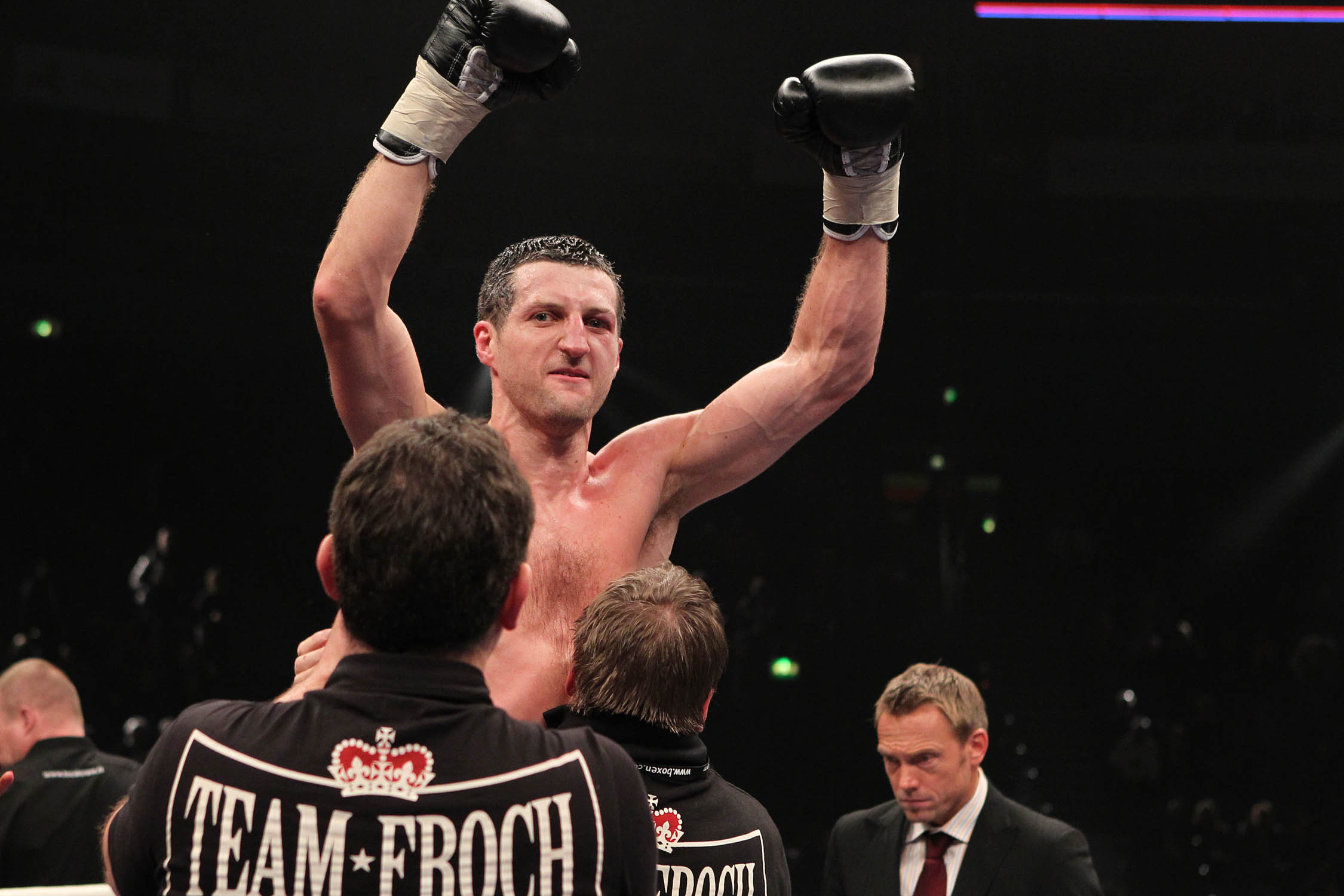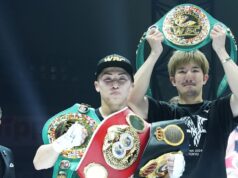By Bart Barry-

In a “Gloves Are Off” prefight conversation more entertaining than a highlight reel of every eerily scored “Face Off with Max Kellerman” episode HBO has aired, British super middleweight George Groves, dangling awkwardly in a frame hung by his opponent as a man who makes mysterious predictions profound to him alone, assured Sky Sports host Johnny Nelson of victory this Saturday in his rematch with Carl “The Cobra” Froch:
“I will knock Carl Froch out on May 31st,” said Groves, diverting briefly his eyes from staring in disbelief at Froch. “And I’ll tell you which punch I’m going to do it with – on fight week.”
“Let me guess,” said Froch in a belittling deadpan. “It’s going to be a left or a right.”
It was fine an example as any of Froch’s singularly unflappable comportment in the face of other men’s threatened aggression. Froch’s approach to insulting opponents, prefight, is more devastating for its calm and often eloquent expressions of contempt so deeply set that his heart rate doesn’t quicken even in self-amusement. Like the wrastlers of bygone years, Froch’s self-belief hails from parts unknown. It is the most essential element of what will almost assuredly be our sport’s largest event in 2014 – one made between British fighters by a British promoter in a British stadium by a British cable network, evidence, perhaps, of how much healthier our sport is when kept out American hands – an event that will sell more tickets than the aggregate of Mayweather-Maidana, Mayweather-Alvarez, Mayweather-Guerrero and Mayweather-Cotto.
Froch’s self-belief, an entity that ranges liberally in the large field between confidence and arrogance, was once merely amusing to American aficionados. In his first trip to our continent, Froch came within 14 seconds of losing to a diminished Jermain Taylor. Six months later, in a dreadful start to a wonderful concept, Froch decisioned American Andre Dirrell in the inaugural match of Showtime’s “Super Six” tournament, a snakebitten arrangement that nevertheless got both its creator, Ken Hershman, and its winner, Andre Ward, promoted to HBO, and made an international star of Froch, the colorful runner-up. Froch won a hometown decision of sorts over Dirrell by revealing the American was an athlete, not a fighter, while warming to the idea of a fight even if not knowing how properly to perform one. Froch then lost a close decision to Mikkel Kessler in Denmark, before defeating Arthur Abraham and Glen Johnson – when both were more highly considered than we may remember.
Froch’s stature and confidence grew disproportionately, making him quite likable to strong-character types: For once a man claiming to be more than appearances indicated was more than appearances indicated. Froch has proved many times more than a sum of his parts in a prizefighting ring; his reflexes are good, as is his chin, and he has power enough that no one engages him straight away or else gets iced, but his defense is porous and his footwork is ungainly and his punches’ effect appears to derive more from his belief in their effect than anything resembling effective technique.
He was outfought and given his first defeat in 2011 by Andre Ward, a transcendentally good fighter before his semiretirement as an HBO commentator, but even in that fight it was Froch, not Ward, who appeared stronger in the latter 18 minutes. Then in a twist only American cable television could devise, the winner of Showtime’s super-middleweight tournament, Ward, was unable to fight Showtime’s super-middleweight house fighter, Lucian Bute – for whom crowning a suitable opponent appeared to be the entire point of the tournament. Froch signed-up to fight Bute instead. Froch went through Bute like a roller-coaster train through a pile of shaving cream, stopping the undefeated Romanian in round 5 and denying boxing’s legion of malcontent fans one more match, Ward-Bute, they were never going to get anyway. Six months later, Froch made a homecoming to Nottinghamshire and flattened Yusaf Mack in three rounds. Then he decisioned Mikkel Kessler a year ago in their rematch in London.
Six months after that, Froch took on an undefeated Londoner who’d once acted as his sparring partner, George Groves, in a match so lightly considered in the United States it didn’t land on a network called AWE till a month before opening bell – with neither Showtime, who introduced Froch to American audiences, nor HBO, who finances Andre Ward’s semi-retirement with commentating gigs, bothering to carry it. Had more than a handful of Americans been able to see the match, they’d have seen Froch conclusively outclassed for nearly every minute of the match, getting drilled with righthands, and getting made to look fragile by righthands, in a way few would believe.
Worse yet were Froch’s punches. They appeared, in the opening two or three rounds, like open-handed cuffs. The Cobra looked like nothing so much as a man alternately slapping either end of a large watermelon while staggering drunkenly forward in a head-lowered rage. And that was before Groves put the stopwatch to Froch’s every hung jab, blasting the titlist with even more righthands, blasting him enough not only to drop and wobble him in round 1, to hurt him in a way no one had before, but also to make Froch throw the sort of push-off jab that invites an opponent’s fury and incites aficionados’ contempt. There was contempt everywhere in that ring, and finally it was contempt – that which Froch felt for the usurper Groves – that caused Froch to surge obdurately forward in round 9, catching Groves with clean shots enough to make referee Howard Foster interfere with the match and call-out a TKO victory for Froch.
The fans were displeased as Groves was, though Foster’s comportment was not dishonorable, however the honorable International Boxing Federation ruled shortly after considering what sanctioning fees it might collect for a mandatory rematch. And so we have one, a fight expected to sell 80,000 tickets and fill London’s Wembley Arena for what knowledgeable British commentators are openly calling one of the largest prizefights in the history of their island.
It appears Groves may have Froch’s number in a way reminiscent of Antonio Tarver having Roy Jones’, or in keeping with the sparring partner tradition, in the way Paul Williams had Antonio Margarito’s. Froch has even gone so far as to hint it may be his final prizefight. It won’t be, of course, but it is noteworthy nevertheless as a reminder: Sporting characters original as Froch appear so rarely on American television screens it behooves us to watch and appreciate them whenever we’re granted the access.
Bart Barry can be reached at bart.barrys.email (at) gmail.com









